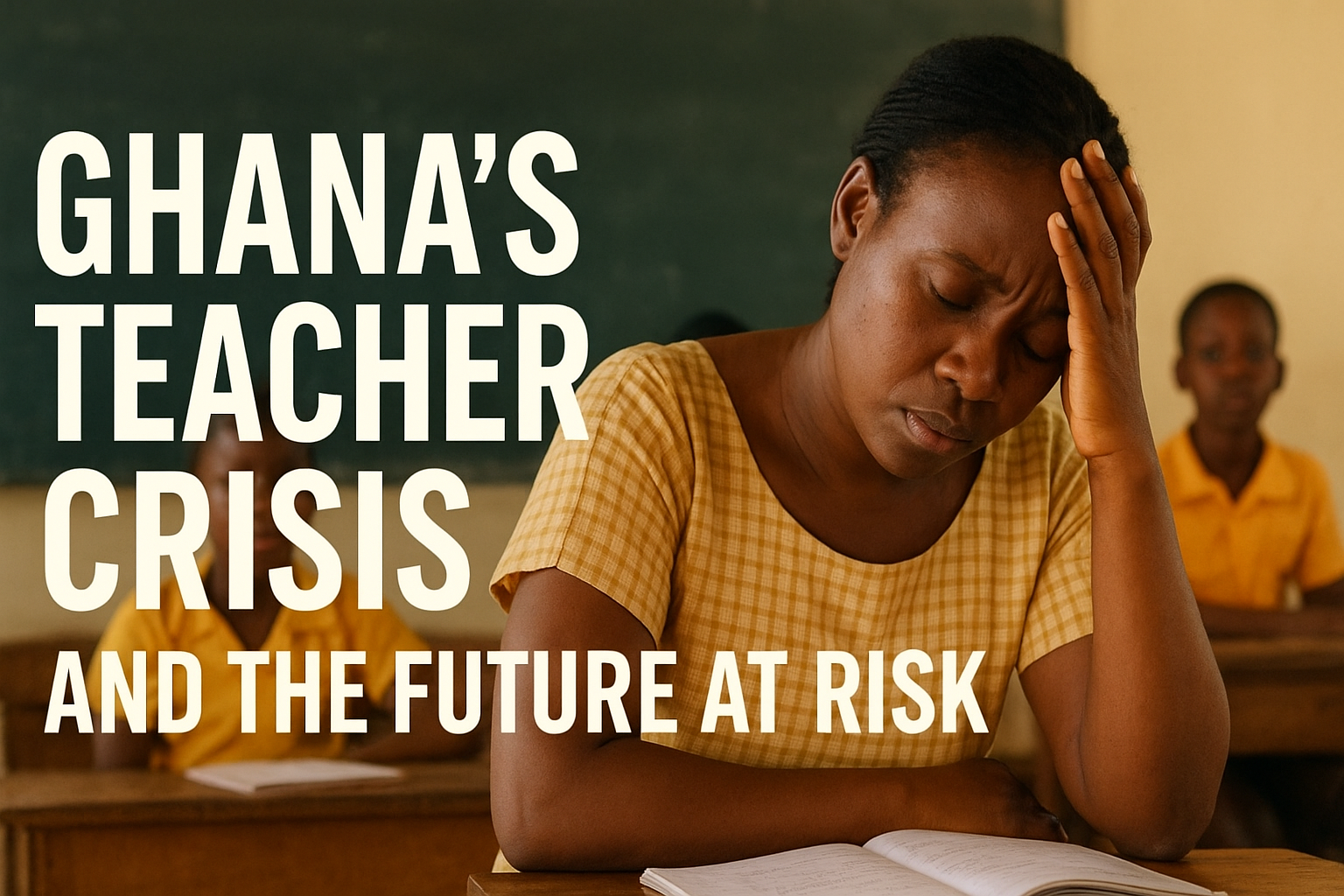Ghana’s Teacher Crisis and the Future at Risk

Ghana’s Teacher Crisis and the Future at Risk. In every nation, teachers are the silent builders of destiny. They shape minds, nurture skills, and open doors of opportunity. Yet, in Ghana, the very individuals who carry the future of millions of children are struggling in silence. Salary delays, corruption, unemployment of graduates, and a lack of respect for the profession have created a crisis that threatens not only teachers but the entire nation. If this issue is not addressed urgently, Ghana risks crumbling the very foundation of its development.
Table of Contents
A Teacher’s Sacrifice: The Human Story
Imagine a young teacher posted to a remote village school. For months, she reports to class without pay. She teaches in a building with no electricity, sometimes without desks or even chalk. Out of love for the children, she buys extra books and supplies with money she doesn’t have. When her salary finally comes, someone demands a cut—an “agent fee” for processing the payment.
This is not just her story. It is the story of many teachers across Ghana. They remain dedicated to their students, even when their own lives are filled with hardship. Their resilience deserves applause, yet their struggles deserve urgent solutions.
The Noble Profession, the Harsh Reality
Teaching is described as a noble calling. Every president, doctor, nurse, lawyer, and engineer once sat before a teacher. Without teachers, no other profession would exist. Yet, in Ghana, teachers feel abandoned. They carry heavy workloads with limited resources and receive salaries that do not reflect their importance to society.
For decades, governments have acknowledged education as the key to national development, but when policies are put in place, the welfare of teachers often becomes an afterthought. This contradiction between words and actions has left many teachers feeling unappreciated and powerless. Ghana’s Teacher Crisis and the Future at Risk.
Salary Delays and the “Agent Percentage” Scandal
One of the most painful realities in Ghana’s education system is the issue of delayed salaries. It is common for teachers, especially those newly recruited, to work for several months or even years without receiving their pay. In the meantime, they take loans, borrow from friends, and struggle to provide for their families.
When the salary arrears are finally released, some teachers are confronted with a new obstacle: the so-called “agent.” These middlemen, often connected to offices within the system, demand a percentage of the money before releasing it. Teachers report losing between 10% and 30% of their hard-earned salaries this way.
This practice is nothing short of corruption. It humiliates teachers, exploits their desperation, and exposes deep cracks in Ghana’s payroll and education administration systems. No professional should beg or pay a bribe to access their own salary. Ghana’s Teacher Crisis and the Future at Risk.
The Forgotten Graduates of 2023
The crisis does not end with those already in the classroom. In 2023, thousands of newly trained teachers graduated from colleges of education, fully certified and eager to serve. Yet, many of them remain at home, unemployed.
This situation is alarming for several reasons. First, classrooms across Ghana remain overcrowded. Some rural schools operate with a single teacher handling multiple classes. Second, Ghana invested resources into training these graduates, but the investment is being wasted while their skills lie idle. Third, unemployment is demoralizing young professionals and making the teaching profession unattractive to future students.
The paradox is clear: Ghana desperately needs teachers, yet trained teachers are left at home while children sit in underserved classrooms. This is not only a waste of human capital but also a betrayal of national priorities.
Why This is a National Crisis, Not Just a Teacher Issue
Some may think this is simply a problem for teachers. In reality, it is a national crisis. Poorly motivated teachers cannot deliver quality education. Overburdened or unemployed graduates cannot inspire learning. Frustrated professionals often look for opportunities outside the country or leave the profession entirely.
The result is a chain reaction:
- Poor teacher morale leads to poor classroom performance.
- Poor classroom performance leads to low student achievement.
- Low student achievement results in a weak workforce.
- A weak workforce translates into poor national development.
Education is the engine of every country’s progress. If the engine is weak, the entire vehicle of development slows down. Neglecting teachers is, therefore, neglecting Ghana’s future.
Lessons from Other Nations
The world offers many lessons. Finland transformed its economy by prioritizing teacher training and respect. Singapore built one of the best education systems by investing in teacher salaries and professional growth. Rwanda, once torn apart by crisis, rebuilt its society partly by strengthening its education sector, with teachers at the center of reform.
These countries prove one simple truth: when you take care of teachers, you take care of the nation. Ghana has the potential to follow this path, but only if it treats teacher welfare as a national emergency.
What Ghana Must Do
To end this crisis, Ghana must adopt bold and urgent solutions. Words and promises are no longer enough. Here are some key actions:
- Timely and Transparent Salary Payments
Salaries must be processed and released on time through automated systems that eliminate middlemen. Technology should make salary corruption a thing of the past. - Immediate Employment for Waiting Graduates
The 2023 trained teachers should be posted without delay. This will reduce classroom overcrowding, restore hope to graduates, and strengthen the education workforce. - Fair Incentives and Support
Teachers in rural areas should receive housing support, rural allowances, and better teaching resources. This will make postings to underserved communities attractive and sustainable. - Accountability and Integrity in Education Administration
Anti-corruption measures must be enforced within the Ghana Education Service and Controller and Accountant General’s Department. Teachers must not pay bribes for postings, promotions, or salaries. - National Respect and Recognition for Teachers
Beyond pay, teachers need dignity. National campaigns, awards, and consistent government recognition can help restore respect for the profession.
A Respectful Call to Leadership
Mr. President, ministers, and executives: this is not just another policy issue. It is a matter of national survival. The welfare of teachers is not charity; it is the bedrock of Ghana’s development. When teachers are supported, children succeed. When children succeed, the nation thrives.
Your leadership is urgently needed to end salary delays, employ waiting graduates, and restore dignity to teaching. The time to act is now.
Ghana’s Teacher Crisis and the Future at Risk.
Despite all challenges, Ghanaian teachers remain resilient. They wake up early, travel long distances, and teach with limited tools. They do so because they believe in the children they serve. But no amount of sacrifice can replace the role of government support.
If Ghana wants a future filled with doctors, engineers, innovators, and visionary leaders, then Ghana must take care of the teachers who will raise them.
Let us give our teachers dignity today, so they can build the leaders of tomorrow.
